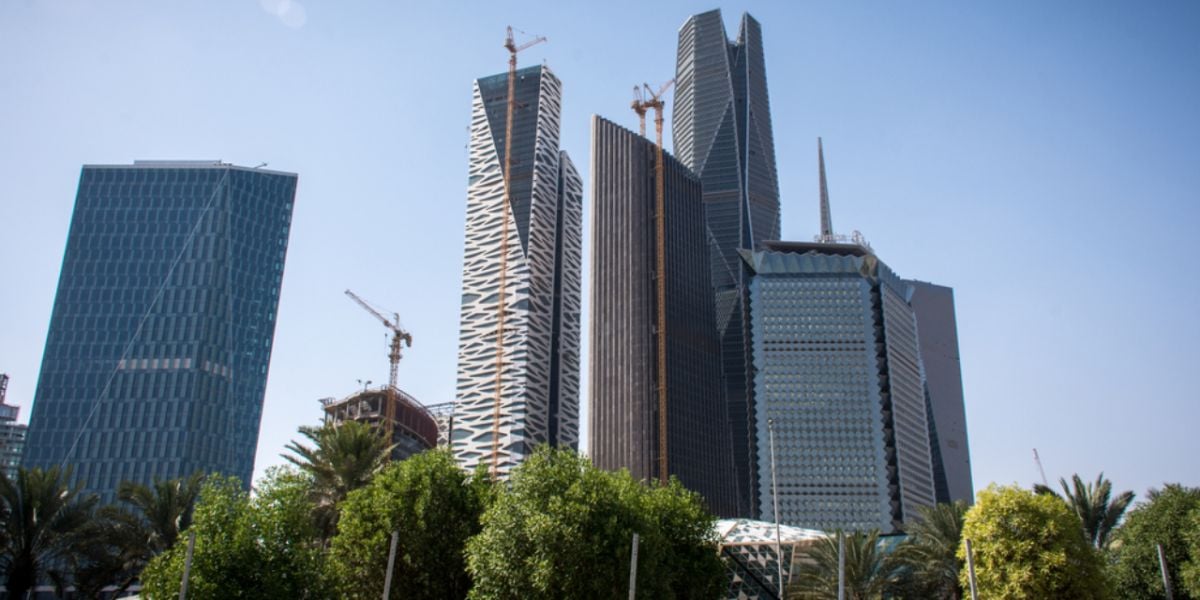
As the capital city of Saudi Arabia, Riyadh is one of the biggest urban communities in the country and is home to a large number of expats. Riyadh is known to be the heart of Saudi Arabia, the place where decisions are taken. Most government agencies and ministries are located there, as well as foreign embassies.
Riyadh offers unlimited opportunities for those who are looking for a job. Most people living in Riyadh work in or close to government authorities, but you can also find several local and foreign companies looking for human resources all around the city.
Riyadh's economy
Riyadh is a prosperous city, as evidenced by the wealth of Saudi nationals and princes living there. Besides, you can find many shopping outlets, a vast number of eateries, and various popular hotels, catering to the needs of everyone. Most expats are hired by these businesses.
With many State-subsidized and private schools, education seems to be one of the most promising fields in Riyadh, especially for qualified expats. English is turning into a standard in everyday life, so there is a great demand for English teachers.
Banking, finance and foreign exchange are other promising fields in Riyadh since a large portion of the significant firms are located there.
Unemployment in Riyadh and Saudisation
Saudi Arabia requires a considerable and increasingly innovative workforce to support its financial expansion plans, from specific college graduates to specialists. At the same time, Saudi Arabia has a high unemployment rate.
As of the start of 2024, 5.1% of the population was unemployed. Also, around 63% of the population was less than 30 years old during the same period. Since large numbers of young graduates are entering the workforce around a similar time, youth unemployment rate is fairly high.
To encourage Saudi nationals to work in Riyadh's private sector and thus fill in the available vacancies, the government started the "Saudization" process, which has four phases. Today, it is more difficult for expats to be hired in some industries. Also, employers are now more reluctant to undertake the procedures relating to obtaining a work permit for foreign workers, except in specific sectors where the required skills are not available locally.
Job hunting in Riyadh
Because of the way work visas work in Saudi Arabia, you will need a valid job offer before you can travel to the country. This means that you will probably need to secure a job in Riyadh remotely. There are lots of ways in which you can approach this.
The first place to start is probably one of the many job hunting portals focused on Saudi Arabia, like Bayt, Naukrigulf, Mihnati and others. International career websites also list job offers from the capital: check out FounditGulf, Glassdoor, Indeed, and others.
How to apply for a job in Riyadh
When applying for a job in Riyadh, keep in mind that Saudi employers typically look for very specific expertise when hiring expatriates, especially, since they have to justify employing an expatriate as opposed to a Saudi Arabia citizen. This is why it is important that you highlight the specific skills required for the position you are applying for — both in your CV and cover letter.
Another way to go about job hunting in Riyadh is to send out your CV and cover letter to local or international companies in the city that interest you. You can find prospective candidates on Linkedin and try to get in touch with HR managers of the companies you would like to work for. Alternatively, you can send your CV and cover letter to companies' corporate emails inquiring if a position in your field is available.
Here are a few extra tips for applying for a job in Riyadh:
When applying for a position that requires expats, you can send out a standard Western-style CV. It can be in the chronological format (where you list your work experience in reverse order, starting from the latest position), skill-based format (where you center your CV around the skills and expertise that you want to highlight) or mixed-format (a combination of elements from both formats described above).
In most situations, sending your CV and cover letter in English would be perfectly okay. However, if it is specifically stated in the job ad that a knowledge of Arabic is required, it is best to add copies of your CV and cover letter in Arabic.
When composing your cover letter, it is recommended to keep as specific to the position you are applying for as possible. Make sure to highlight what makes you the best candidate for the job: mention relevant experience, skills, and career goals.
When composing your CV, take note of the local sensitivities and restrictions. For example, it's best to avoid making any references to religious groups or activities or certain countries like Israel or Iran.
Finally, it's always a good idea to invest some time into research before you compose your CV. Learn more about the company you are applying for, look through the job ad itself, and take note of the language used and the qualities emphasized. You can then use all of this information to customize your application to stand out among other candidates.
How to apply for a working visa to Saudi Arabia
To work in Saudi Arabia legally, you will need to apply for an Iqama. The Iqama is a national residency permit for foreigners who have come to Saudi Arabia for work. Your Iqama card will include the following information:
- Your legal name and nationality;
- Your date of birth;
- The Iqama number;
- Your religion;
- Your job title and the name of your employer.
Important:
You must have your Iqama card with you at all times. If you are stopped by police and can't present your residency permit, you may be fined upwards of SAR 3,000 and even risk a jail term of up to six months. If you've lost your Iqama card or if it has been stolen, make sure to report this immediately. If you fail to report the loss of your Iqama in time, you will be fined upwards of SAR 3,000. Additionally, overstaying your Iqama can result in deportation.
The Iqama application process is generally handled by your employer. They will start by submitting an application to the Ministry of Labour and Social Development. Once this has been approved, your employer will get a Visa Authorisation number and receive the Power of Attorney via the Ministry of Foreign Affairs.
Next, when you arrive in the country, your employer will need to secure your Iqama within 90 days. Once your Iqama is ready, you will be able to apply for residency permits for your family members. Note that your family's Iqamas will be tied to your residence permit and have the same expiration dates.
Important:
Note that working in Saudi Arabia without an Iqama is illegal and can result in serious consequences: you may be asked to pay a fine of up to SAR 10,000 and can also face arrest and deportation.
Special privilege Iqama
As you read more about the Iqama application process, you may come across the term “special privilege Iqama”. The Special Privilege Iqama Law allows exceptionally qualified foreigners to live and work in the Kingdom while enjoying a number of additional privileges like an easy road to owning real estate, renting out properties, etc. To apply for a permanent Iqama, your employer will need to pay upwards of SAR 800, 000. A temporary one-year Iqama will cost around SAR 100,000. All information related to the Premium Residency can be found on the Saudi Premium Residency website.
Good to know:
If you plan to work in Saudi Arabia for a shorter term, you can apply for a business visa or a work visit visa — the application process for these is much easier.
On a business visa, you can conduct business transactions with a Saudi company.
On a work visit visa, you can come to Saudi Arabia as an employee of a foreign company and stay in the country for 30 to 90 days.
A typical working day in Riyadh
Your working day in Riyadh will most likely start at 8 am on a Sunday and conclude at 6 pm on a Thursday. Fridays and Saturdays are official days off. Naturally, your working hours may fluctuate and be guided by the specifics of your occupation. However, by law, the working week lasts for a maximum of 48 hours and is shortened to 30 hours per week during the holy month of Ramadan.
In most companies, you will get 21 days of paid leave — which will go up to 30 days after five years of employment. There are also four public holidays in the country during which most companies and institutions don't work:
- Eid Al Fitr (three to seven days off);
- Eid Al Adha (three to seven days off);
- Saudi National Day (23 September);
- Founding Day (22 February).
Workers' rights in Saudi Arabia
Most expats who move to Saudi Arabia do so for work. This shifts the general focus in the expat community towards working hard and saving more — and this idea is also enforced by Saudi work culture.
Overtime is very common in Saudi Arabia. In fact, you may discover that you are considered to be “on call” way past your working hours. You may also find it very difficult to negotiate flexible working hours or remote working options in Riyadh.
Another thing to take into account is that violations of foreign workers' rights are also not uncommon in the country. This is especially true of manual labor. This is propagated by the fact that there are no trade or labor unions in the country. This makes solving work-related disputes and protecting workers' rights even more complicated. While the practice of confiscation of the employee's passport by a Saudi employer is not as prevalent as it might have been in the past, you will still require your employer's approval before leaving the country. Essentially, you will need to obtain an exit/re-entry visa if you are going to leave the country. This will have to be done through your HR. This means that you will have to inform your company in advance before crossing any border.
Work etiquette in Saudi Arabia
Navigating the local workplace can be quite challenging for a newcomer — even in a city like Riyadh. While the country is more open than ever to outside influence and business practices are being modernized, a lot of workplace interactions are still guided by tradition and there are a number of potential faux-pas to watch out for.
The first thing to keep in mind is that Saudi Arabia is a highly hierarchical society — and the modern workplace is not an exception. This means that you should follow and not discuss the decisions and instructions of your superiors — especially as a new hire in the company. Major decisions are almost always made by a select group of people and behind closed doors, and all-office brainstorming sessions are incredibly rare.
As a new employee, you will generally not be expected to be proactive but rather to tend to your specific responsibilities. Note that questioning management decisions and debating your superiors is not a favorable communication strategy.
As many companies in Saudi Arabia are run as family businesses, you need to be aware that your promotion opportunities may be quite limited, as nepotism has a stronghold in many local workplaces.
Networking is an essential component of career success in Saudi Arabia. Meeting the right people in your line of work can introduce you to new opportunities and propel your professional success. It is, thus, a good idea to attend business forums, professional conferences and other events related to your industry. Those events are becoming more and more common in Riyadh.
Women in the workplace in Saudi Arabia
Saudi Vision 2030 includes initiatives that encourage women to play a larger role in Saudi Arabia's economy. As a result, by 2023, almost one in three employees in the country were women. By 2030, this number is expected to increase by 35%.
However, prior to the new initiatives, the situation in the country was quite different, and the role of women in the workplace was very restricted.
The positive development of more women entering the workplace is, unfortunately, offset by a substantial gender pay gap: on average, women in Saudi Arabia earn over 50% less compared to their male colleagues.
Important:
It is important to note that with new Saudization policies being put in place, some jobs once open to foreigners have now been limited to Saudi nationals only.
We do our best to provide accurate and up to date information. However, if you have noticed any inaccuracies in this article, please let us know in the comments section below.








